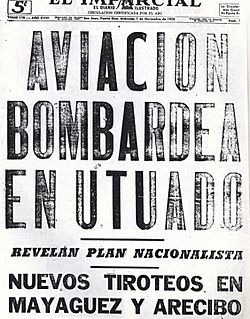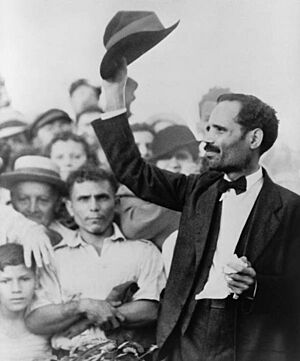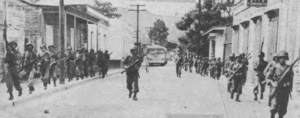Utuado uprising facts for kids
Quick facts for kids Utuado Uprising |
|||||||
|---|---|---|---|---|---|---|---|
| Part of Puerto Rican Nationalist Party revolts of the 1950s | |||||||
 "El Imparcial" headline "Aviation Bombs Utuado" |
|||||||
|
|||||||
| Belligerents | |||||||
| Commanders and leaders | |||||||
| Casualties and losses | |||||||
| 4 Nationalist dead | 3 dead (2 National Guardsmen and 1 police officer) | ||||||
The Utuado uprising was a major event in Puerto Rico on October 30, 1950. It was a revolt against the United States government in the town of Utuado. This uprising was part of several protests that happened at the same time across Puerto Rico. Other towns like San Juan, Mayaguez, Arecibo, Ponce, Peñuelas, and Jayuya also saw similar events. These events were led by the Puerto Rican Nationalist Party.
Contents
How the Revolt Started
The Nationalist Party Forms
The Puerto Rican Nationalist Party was created on September 17, 1922. Its first leader was José Coll y Cuchí. He wanted to make big changes to Puerto Rico's economy and social programs. In 1924, a lawyer named Pedro Albizu Campos joined the party. He quickly became its vice president.
Albizu Campos was the first Puerto Rican to graduate from Harvard Law School. He had served in the U.S. Army during World War I. He strongly believed that Puerto Rico should be an independent country. He even thought that fighting might be necessary to achieve this. By 1930, Coll y Cuchi left the party because he disagreed with Albizu Campos. On May 11, 1930, Albizu Campos became the president of the Nationalist Party.
Tensions Rise in Puerto Rico
In the 1930s, the U.S.-appointed governor of Puerto Rico, Blanton Winship, and police colonel Riggs used strong methods against the Nationalist Party. In 1936, Albizu Campos and other party leaders were arrested. They were first jailed in San Juan and then sent to a federal prison in Atlanta.
On March 21, 1937, Nationalists held a parade in Ponce. Police officers shot into the crowd. This event became known as the Ponce massacre. 19 people died, including two police officers and 17 unarmed Puerto Ricans. One of the victims was a 7-year-old girl. Even though the police did the shooting, Albizu Campos was arrested. He was sentenced to ten years in a U.S. federal prison. Campos finally returned to Puerto Rico on December 15, 1947.
The Gag Law is Passed
On May 21, 1948, a new law was proposed in the Puerto Rican Senate. This law aimed to limit the rights of groups that wanted independence for Puerto Rico. The Senate, led by Luis Muñoz Marín's party, approved the law that same day. This law was similar to the anti-communist Smith Act in the United States. It became known as the Ley de la Mordaza, or Gag Law. The U.S.-appointed governor, Jesús T. Piñero, signed it into law on June 10, 1948.
Under this new law, it was a crime to print or share any material that aimed to stop or destroy the government. It was also illegal to organize any group with such a goal. Even singing a patriotic song became against the law. The law also made it illegal to show the Flag of Puerto Rico. If someone broke this law, they could face up to ten years in prison or a large fine.
Dr. Leopoldo Figueroa, a member of another political party, spoke out against the law. He said it was unfair and went against the First Amendment of the U.S. Constitution. This amendment protects Freedom of Speech. On June 21, 1948, Albizu Campos gave a speech in Manatí. He explained how the Gag Law violated people's rights. Many Nationalists came to hear him speak and to protect him from arrest.
The 1950 Uprisings
Planning the Revolution
From 1949 to 1950, the Nationalists started getting ready for an armed revolution. They planned for it to happen in 1952. This was when the United States Congress was expected to approve a new political status for Puerto Rico. This status was called "Free Associated State."
Albizu Campos believed this "new political status" was just a way to keep Puerto Rico as a colony. So, he called for an armed revolution. He chose the town of Jayuya as the main base for the revolution because of its location. Weapons were stored in the home of Blanca Canales.
The Revolt Begins
On October 26, 1950, Albizu Campos was in Fajardo for a meeting. He learned that police had surrounded his house in San Juan to arrest him. He also heard that other Nationalist leaders had already been arrested. He managed to escape from Fajardo and ordered the revolution to begin right away.
On October 27, in the town of Peñuelas, police surrounded a group of Nationalists and fired at them, killing four people. Then, on October 30, the Nationalists launched uprisings in several towns. These included Ponce, Mayagüez, Naranjito, Arecibo, Utuado (which is the Utuado Uprising), San Juan (San Juan Nationalist revolt), and Jayuya.
The first major event of these uprisings happened early on October 29. Police surrounded the home of Melitón Muñiz Santos, a Nationalist leader in Peñuelas. They claimed he was hiding weapons. Without warning, the police shot at the house, and a gunfight started. Two Nationalists were killed, and six police officers were hurt. Several Nationalists were arrested after this event.
What Happened After
The main leaders of the Nationalist party were arrested. This included Albizu Campos and Blanca Canales, who led the Jayuya Uprising. They were all sent to prison and served long sentences.
On November 1, 1950, two Nationalists, Griselio Torresola and Oscar Collazo, attacked the Blair House. This was where U.S. President Harry S. Truman was staying. They tried to assassinate him. Torresola and a White House police officer died in the attempt. Collazo was arrested and sentenced to death, but President Truman later changed his sentence to life in prison. Collazo eventually received a presidential pardon.
The Puerto Rican Nationalist Party made another big effort on March 1, 1954. On that day, Nationalist leader Lolita Lebrón and her friends Rafael Cancel Miranda, Irvin Flores, and Andres Figueroa Cordero attacked the United States House of Representatives. They were charged with attempted murder and other crimes.
See also
 In Spanish: Grito de Utuado para niños
In Spanish: Grito de Utuado para niños
- Elías Beauchamp
- Ducoudray Holstein Expedition
- Grito de Lares
- Intentona de Yauco
- Río Piedras massacre
- List of Puerto Ricans
 | Selma Burke |
 | Pauline Powell Burns |
 | Frederick J. Brown |
 | Robert Blackburn |



